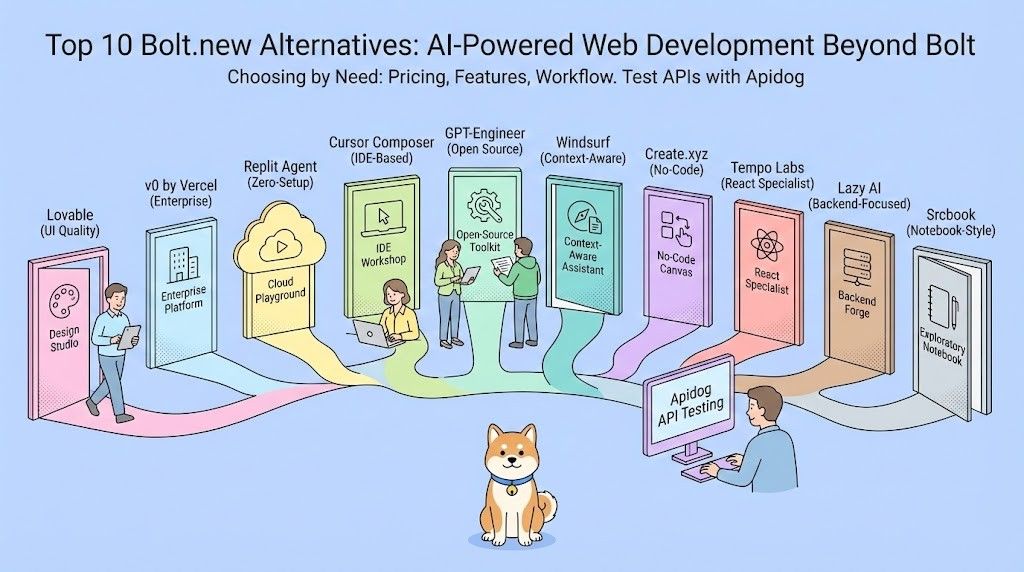In this data-driven world, efficiency in database management has become the way to success. From a seasoned database administrator to a developer working with data, the right query tool can guarantee high productivity and effectiveness. In this comprehensive guide, we will go over the top 10 database query tools that have transformed the way we interact with and manage our data.
What do we understand by Database Query
A database query is simply a request for data or information from a database. It is generally written in some form of query language, most common being SQL: Structured Query Language. Queries can also do a variety of things such as:
- Retrieving Data: Specifies which data to retrieve from one or more tables.
- Inserting Data: Adds new records to a table.
- Updating Data: Modifies existing records in a table.
- Data Deletion: The process of eliminating some records in a table.
- Data Filtering: Conditions that allow retrieval only for data which meets the set criteria.
Queries can either be simple, or they can even be complex where there are several tables and operations involved; these are what one uses to interact with a database and manage or work with data within them.
1. MySQL Workbench: One-Stop Solution
MySQL Workbench is the integrated tool for database design, development, and administration.

Key features
- Visual database modeling: Easily create and modify database schemas with an intuitive interface.
- SQL editor with syntax highlighting: Write and execute queries with ease.
- Performance tuning tools: Optimize your database for peak performance.
- Data migration utilities: Seamlessly transfer data between different database systems.
MySQL Workbench has a wide variety of tools within it, which are extremely useful for working with MySQL databases. The toolset contains basic functionality helpful for beginning users and advanced functionality that seasoned users appreciate.
2. pgAdmin: The PostgreSQL Powerhouse
For those of us who would consider themselves PostgreSQL users, this tool is an important one.

Now, here is what pgAdmin has
Key features:
- Cross-platform compatibility: Available on Windows, macOS, and Linux
- Graphical query builder: Construct complex queries without writing SQL
- Backup and restore functionality: Your data are always safeguarded.
- Extensible plugin architecture: You can extend the functionality in any desired direction.
The friendly interface of pgAdmin, along with its powerful features, makes it an indispensable utility for those working with PostgreSQL databases.
3. DBeaver: The Universal Database Tool
DBeaver is a universal database tool that supports a wide range of database management systems.

Key features:
- Support for multiple database types: With its help, one can work with SQL, NoSQL, and cloud databases.
- ER diagrams and data modeling: At your service for visualizing how your database is organized.
- Data export and import: With it, one can export data to systems of other formats.
- SQL editor with code completion: Thanks to it, one will be able to write queries faster and with fewer errors.
DBeaver's flexibility, coupled with a big set of features, turns it into the right choice for those who interact with many different types of databases.
4. Navicat: Premium Database Administration Toolset
Navicat provides a premium set of database management tools.
Key features:
- Support for major database systems: Work with MySQL, PostgreSQL, Oracle, and more.
- Visual query builder: Drag-and-drop interface to build complex queries easily.
- Data synchronization: Synchronizing databases on a different server.
- Automated tasks and scheduling: Automating repetitive database operations.
While Navicat will be more expensive up front, the powerful functionality and ease of use make it well worth the price to many professionals.
5. SQL Server Management Studio (SSMS): Flagship Tool by Microsoft
For professionals working with Microsoft SQL Server, this tool is the standard.

Key features:
- Integrated environment to manage SQL Server: Perform all SQL Server management tasks
- Object explorer: Easily manage and navigate database objects
- Query plan visualization: Visually optimize performance of queries with execution plans
- Integration with Azure Data Studio: Work seamlessly with cloud-based databases
SSMS is a must-have tool for any organization working with Microsoft SQL Server. A powerful and familiar interface to manage databases.
6. DataGrip: JetBrains' Intelligent Database Environment
DataGrip by JetBrains is an integrated development environment for relational databases. A variety of different database types are supported.

Key features:
- Smart code completion: Context-aware suggestions help to write queries in less time.
- Refactoring tools: Provide easy renaming and restructuring of database objects.
- Version control integration: Enables you to track changes and work together with your colleagues.
- Customizable UI: Personalize the interface according to your workflow.
Due to its advanced features, DataGrip along with the JetBrains pedigree is favored by developers who cherish productivity above all.
7. Toad: The Oracle Specialist
Although Toad supports numerous database systems, the product is most famous for its Oracle support.

Key features include:
- Code analysis and optimization: Maintain good query performance and understandability
- Database health check: Proactively detect and resolve potential problems
- Team collaboration tools: Share scripts and database objects among your team
- Automated testing: Ensure quality in your database code with built-in testing features
The breadth of features combined with deep Oracle integration makes Toad an indispensable tool for a range of Oracle database professionals.
8. Apidog: API-First Database Tool
Apidog represents a category unto itself in our list, due to the heavy focus on API development and testing with database integration.

Key features:
1. Superior API Testing Capabilities
- Comprehensive Testing Framework: Apidog provides robust API testing functionalities, allowing users to create, manage, and execute tests seamlessly.
- Automated Testing: Users can automate their API tests, ensuring that any changes in the database or API endpoints do not break existing functionality.
2. User-Friendly Interface
- Intuitive Design: Apidog features a clean and user-friendly interface that makes it easy for both beginners and experienced developers to navigate and utilize its features effectively.
- Visual Query Builder: The visual query builder simplifies the process of constructing complex queries without needing extensive SQL knowledge.
3. Integration Features
- Seamless Integration with Other Tools: Apidog integrates easily with various development and CI/CD tools, enhancing workflow efficiency. This includes popular platforms like GitHub, Jenkins, and Slack.
- Support for Multiple Databases: It supports a wide range of databases, allowing users to work with their preferred systems without compatibility issues.
4. Collaboration and Sharing
- Team Collaboration: Apidog facilitates collaboration among team members by allowing users to share API documentation and testing results easily.
- Version Control: Changes can be tracked, and previous versions of APIs can be accessed, which is essential for maintaining consistency in development.
5. Advanced Debugging Tools
- Real-Time Monitoring: Users can monitor API performance in real-time, identifying issues quickly and efficiently.
- Detailed Logs and Reports: Apidog generates detailed logs and reports, making it easier to troubleshoot problems and analyze performance metrics.
6. Customizable Workflows
- Flexible Workflow Management: Users can customize workflows to fit their specific needs, streamlining the testing and development processes.
- Pre/Post Request Scripts: The ability to run scripts before or after requests adds flexibility and control over the testing environment.
7. Community and Support
- Active Community: Apidog has a growing community of users, providing a platform for sharing knowledge, tips, and best practices.
- Comprehensive Documentation: Extensive documentation and tutorials help users maximize the tool's potential.
Not traditionally thought of as a database query tool, the API-centric approach of Apidog pays huge dividends in the modern development of database-driven applications.
By utilizing these, Apidog is considered to be a powerful database query tool that empowers APIs and testing the API development for improvement.
9. HeidiSQL: The Lightweight Powerhouse
HeidiSQL is a free tool that is pretty impressive considering a long list of features.

The key features include:
- MySQL, MariaDB, and PostgreSQL compatibility: Use popular open-source databases
- Database structure and data editing: Database and its content easy to modify
- Export and import functionality: Migrate your data across different formats and systems
- Portable version available: Use on the go without installation
HeidiSQL is a great tool for those who want something lightweight yet capable. Besides its simplicity, it's powerful and holds up rather well against other offerings in the market.
10. Adminer: The Single-File Wonder
Adminer is rather an uncommon database management tool and is available as just one PHP file.
Why would you want to consider this? Well, for the following
Key features:
- Support for multiple database types: MySQL, PostgreSQL, SQLite, and many more
- Small footprint: It is light and very easy to deploy and use even in restricted environments
- Easy to use: The intuitive design makes it easy and efficient in handling databases.
- Security features: It has built-in protection from SQL injection and cross-site scripting.
Adminer is simple and easy to use; hence, it's the best choice for minor database management work or when using shared hosting.
Conclusion: Choosing the Right Tool for Your Needs
It depends on what you may need for your projects, the database systems you are using, and is also a matter of personal preference. Whether you need an all-in-one suite like Navicat, a dedicated tool for SQL Server like SSMS, or a lightweight one such as HeidiSQL, the right tool is out there waiting for you to find it.
Consider factors such as:
- The types of databases you work with
- Your budget constraints
- The level of features and complexity you require
- Integration with other tools in your workflow
You can thus zero in on an appropriate database query tool by giving these factors serious thought and trying out different options to suit your requirements.
The right tool can make a big difference in productivity with your database work. Acquaint yourself with these, and you'll be well on your way to becoming even more effective in the database arena.



